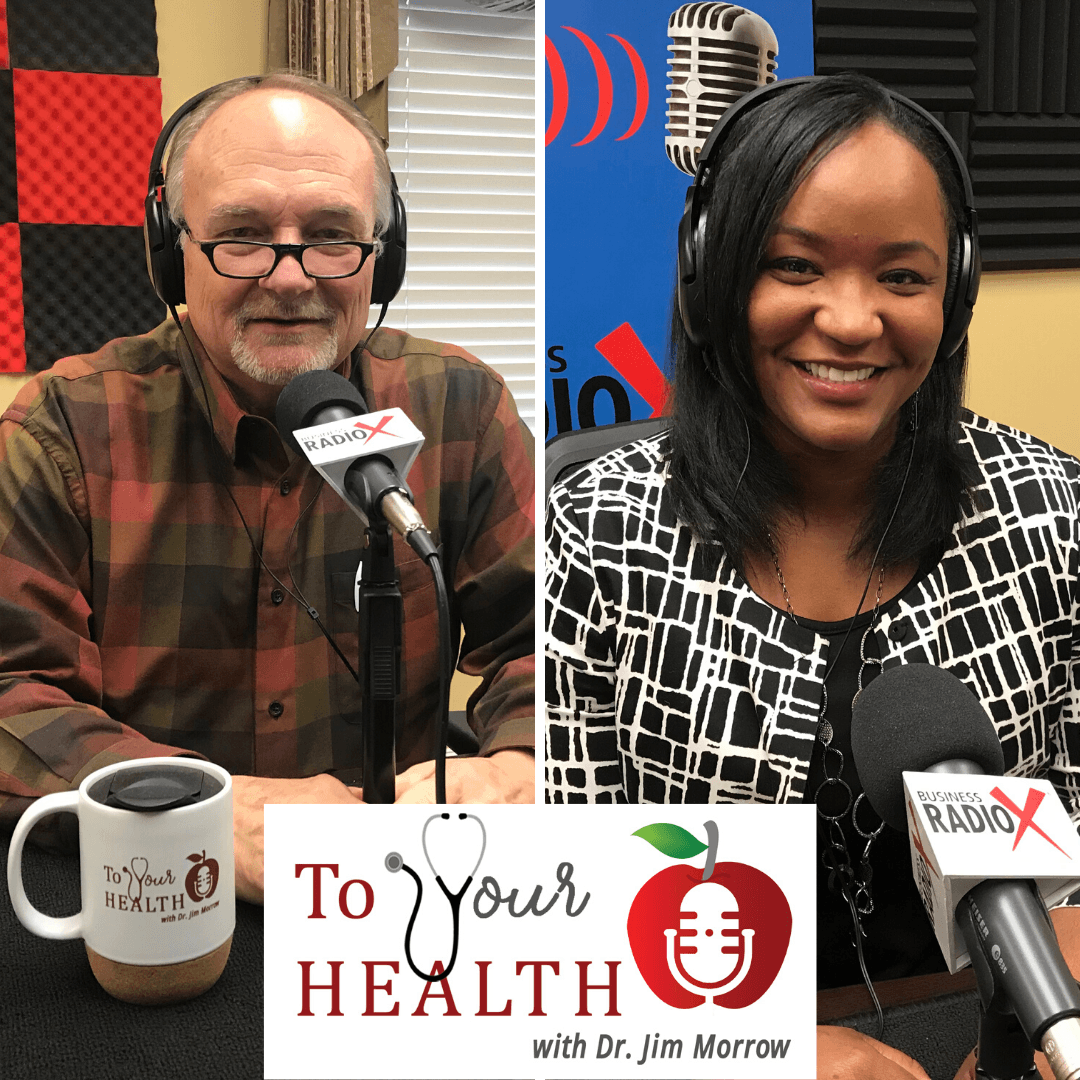

To Your Health With Dr. Jim Morrow: Episode 32, Stress in a Pandemic with Dr. Brooke Jones and a Covid-19 Update
Dr. Morrow discusses dealing with stress in a pandemic with Dr. Brooke Jones, Fresh Start for the Mind. Dr. Morrow also shares a Covid-19 update, which includes a debunking of the “Plandemic” video and comments on the ineffectiveness of hydroxychloroquine. “To Your Health” is brought to you by Morrow Family Medicine, which brings the CARE back to healthcare.
Dr. Brooke Jones, Fresh Start for the Mind

In 2013, Dr. Brooke Jones branched out on her own to open a mental health practice, Fresh Start for the Mind. She wanted a practice that incorporated the mind, body, and spirit. Her love for psychological evaluations became evident in the Alpharetta and surrounding communities. As referrals grew, so did Fresh Start.
Fresh Start for the Mind is a comprehensive mental health practice that provides counseling, psychological evaluations, psychiatry and medication management, coaching, and nutrition support to children, adults, and families. Since its inception in 2013, Fresh Start has grown to over 30 staff members and has maintained a reputation for providing quality and heart-felt services. Fresh Start has three facilities and proudly serves patients in and around Suwanee, Stockbridge, and Canton, GA.
You can find out more at their website or call Fresh Start at 404-808-1161.
About Morrow Family Medicine and Dr. Jim Morrow
Morrow Family Medicine is an award-winning, state-of-the-art family practice with offices in Cumming and Milton, Georgia. The practice combines healthcare information technology with old-fashioned care to provide the type of care that many are in search of today. Two physicians, three physician assistants and two nurse practitioners are supported by a knowledgeable and friendly staff to make your visit to Morrow Family Medicine one that will remind you of the way healthcare should be. At Morrow Family Medicine, we like to say we are “bringing the care back to healthcare!” Morrow Family Medicine has been named the “Best of Forsyth” in Family Medicine in all five years of the award, is a three-time consecutive winner of the “Best of North Atlanta” by readers of Appen Media, and the 2019 winner of “Best of Life” in North Fulton County.
Dr. Jim Morrow, Morrow Family Medicine, and Host of “To Your Health With Dr. Jim Morrow”
Dr. Jim Morrow is the founder and CEO of Morrow Family Medicine. He has been a trailblazer and evangelist in the area of healthcare information technology, was named Physician IT Leader of the Year by HIMSS, a HIMSS Davies Award Winner, the Cumming-Forsyth Chamber of Commerce Steve Bloom Award Winner as Entrepreneur of the Year and he received a Phoenix Award as Community Leader of the Year from the Metro Atlanta Chamber of Commerce. He is married to Peggie Morrow and together they founded the Forsyth BYOT Benefit, a charity in Forsyth County to support students in need of technology and devices. They have two Goldendoodles, a gaggle of grandchildren and enjoy life on and around Lake Lanier.
Facebook: https://www.facebook.com/MorrowFamMed/
LinkedIn: https://www.linkedin.com/company/7788088/admin/
Twitter: https://twitter.com/toyourhealthMD
The complete show archive of “To Your Health with Dr. Jim Morrow” addresses a wide range of health and wellness topics, and can be found at www.toyourhealthradio.com.
Dr. Morrow’s Show Notes
Coronavirus Update
- Hydroxychloroquine has been shown not to be effective and in some cases harmful in Covid-19.
- Patients are often much worse in the second week of the disease.
- Total cases have started to plateau in the US, but with social distancing waning somewhat and states opening up, we will definitely see a bump in cases.
- The healthcare system has been spared the overwhelming push that would have made all of this dramatically worse.
- Masks:
- Wear one anytime in public.
- They protect others from you.
- 44% of people in a NY study who had NO symptoms were found to be positive for having the disease at the time they had no symptoms.
- Antibody Tests:
- There are three antibodies that are tested for in most of these tests.
- IgA, a respiratory antibody.
- One that is produced in response to a respiratory infection. As opposed to a stomach bug or what people insist on calling a “stomach flu”, even though that does not exist.
- IgM
- one that you produce acutely as you are in the midst of an active infection.
- IgG
- One you make that is at the end of an infection and the one that lasts the longest, giving you some degree of immunity to an infection you have already had.
- IgA, a respiratory antibody.
- There are three antibodies that are tested for in most of these tests.
- IgA and IgM can cross react with the coronaviruses that cause the common cold, mainly 229E and OC43.
- IgG is specific for the type of virus that caused a particular infection, such as SARS-CoV-2.
- So, if you get the antibody test, you are looking for a positive IgG antibody to know if you were infected with or exposed to this novel coronavirus.
- We presume that this infers some degree of immunity but we really are not certain of that yet.
- ACE inhibitors and ARBs: stay on them if you take them. They could actually benefit you
- Aspirin: stay on it
- Allergy meds: stay on them; Covid-19 does not cause sneezing. Period.
- “Plandemic” video: so many people sent this to me.
- It is complete bunk.
- You need to understand that scientists are accustomed to saying “I don’t know”
- but the public is accustomed to us having all the answers.
- For the past 75 years, when it comes to infections and public health issues,
- the public has come to expect medicine to know what’s what.
- But this is a totally new virus.
- It’s like the time of Louis Pasteur when scientists did not know everything,
- or hardly anything compared to today.
- Information that I learned two weeks ago is being proven wrong this week.
- Social media and the public’s access to information of all kinds,
- most of it unproven,
- is making it difficult to sort out fact from fiction.
- People have a need to believe something,
- so when they see someone who sounds knowledgeable,
- they want to believe it.
- When it gives them an answer they want to believe it.
- Well, don’t believe one word in that video. Not one.
Stress in a Pandemic
Outbreaks can be stressful
- The outbreak of coronavirus disease 2019 (COVID-19) may be stressful for people.
- Fear and anxiety about a disease can be overwhelming and cause strong emotions in adults and children.
- The outbreak of coronavirus disease 2019 (COVID-19) may be stressful for people.
- Coping with stress in a pandemic will make you, the people you care about, and your community stronger.
- Stress in a pandemic can include
- Fear and worry about your own health and the health of your loved ones
- Changes in sleep or eating patterns
- Difficulty sleeping or concentrating
- Worsening of chronic health problems
- Worsening of mental health conditions
- Increased use of alcohol, tobacco, or other drugs
- Everyone reacts differently to stressful situations
- How you respond to the outbreak can depend on
- your background,
- the things that make you different from other people,
- and the community you live in.
- How you respond to the outbreak can depend on
Our Guest Today:
Brooke Jones, Psychologist and Owner, Fresh Start for the Mind
Fresh Start for the Mind is a comprehensive mental health practice that provides counseling, psychological evaluations, psychiatry and medication management, coaching, and nutrition support to children, adults, and families. Since it’s inception in 2013, Fresh Start has grown to over 30 staff members and has maintained a reputation for providing quality and heart-felt services. Fresh Start has three facilities and proudly serves patients in and around Suwanee, Stockbridge, and Canton, GA.
Question/Topics in this interview:
- What have been some common reactions you’ve seen in response to COVID-19 pandemic?
- Do you have any advice on how to help children cope with these changes?
- What are some specific examples of self-care and how would you recommend our listeners make this apart of their routine?
- How can I support a loved one, who may be directly or indirectly affected by COVID-19?
- If I needed help with managing stress, anxiety, depression, or anger – weather it’s directly or indirectly related to COVID, or in general, where can I find help?
- Do you have any advice on how to help children cope with these changes?
- What are some specific examples of self-care and how would you recommend our listeners make this apart of their routine?
- How can I support a loved one, who may be directly or indirectly affected by COVID-19?
Outbreaks can be stressful (cont’d)
- People who may respond more strongly to stress in a pandemic include
- Older people and people with chronic diseases who are at higher risk for severe illness from COVID-19
- Children and teens
- People who are helping with the response to COVID-19, like doctors, other health care providers, and first responders
- People who have mental health conditions including problems with substance use
- Take care of yourself and your community
- Taking care of yourself,
- your friends,
- and your family can help you cope with stress.
- Helping others cope with their stress can also make your community stronger.
- Taking care of yourself,
- Ways to cope with stress
- Take breaks from watching,
- reading,
- or listening to news stories,
- including social media.
- Hearing about the pandemic repeatedly can be upsetting.
- Take care of your body.
- Take deep breaths, stretch, or meditate
- Try to eat healthy, well-balanced meals.
- Exercise regularly, get plenty of sleep.
- Avoid alcohol and drugs
- Make time to unwind. Try to do some other activities you enjoy.
- Connect with others. Talk with people you trust about your concerns and how you are feeling.














